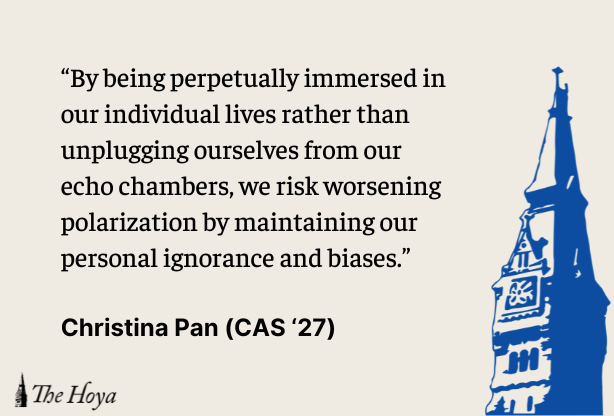Spotify Wrapped just came out and everyone’s sharing their most streamed songs and artists. My top track is “jazz is for ordinary people,” by berlioz. This soothing track plays during my late-night study sessions in Lauinger Library or evening strolls with no particular destination in mind.
The title of this song, however, is what really stood out to me above all else, and has made me reflect a bit on the nature of modern listening habits: Ordinary people may enjoy listening to music of all different genres, but we don’t realize how our habits of music consumption come at a cost. We tune out the world to tune into our playlists. By doing so, we become deaf to our surroundings, especially the sounds of our current political and social realities.
As I pass through Red Square — a place where students often stir discourse, speak out and line the walls with posters — I sometimes pause and observe the people walking by. Most people offer a quick glance at the posters, avoid eye contact with students tabling, then hustle on to their next destination with their earbuds in.
Like most students, I usually have my earbuds in, too. But recently, I’ve learned to appreciate the music of the real world and have forced myself to go a day without drowning out its simple melody.
Yet after unplugging, I’ve noticed a chilly quietness around campus, even during busy midday hours. And it’s simply because most people are immersed in their individual cocoons of reality, spun with the wires of their own headphones.
Our music listening habits enable a strange isolation and ignorance in daily life. By simply putting in some earbuds, it’s easy to drown out the cacophony of sounds our community creates. We can easily mute daily commotion, cheers of celebration or cries for help by raising the volume of our personal soundtracks.
This habitual impulse of putting on headphones drowns out the sounds of daily life — of ordinary people. It enables us to remain simple bystanders in our individualized, comfortable bubbles without reaching out to interact with our increasingly politically polarized reality.
By being perpetually immersed in our individual lives rather than unplugging ourselves from our echo chambers, we risk worsening polarization by maintaining our personal ignorance and biases. After all, when we silence the world around us and are left with just our own thoughts, our personal bubbles stay intact with nothing to pop them.
Music, and art as a whole, should not distract from real-life interactions and issues. Historically, the arts have always been used as a medium to critique political climates, raise awareness and inspire communities to engage with one another. But now, we’ve taken a medium so capable of fostering political discourse and changed it to help us remain polarized from one another.
This must stop. As students, we have to unplug ourselves and stop avoiding crucial conversations, especially in the wake of the recent political crises that are occurring. Rather than turning a blind eye and putting in earbuds so that tables and flyers in Red Square remain background commotion, we should go up to those tables and learn from them, read the posters and listen to what’s going on around us.
It’s discouraging to see how in our current era of rapidly worsening political polarization, we are using art to isolate ourselves rather than to connect with others from all walks of life.
Hyperfixation of individualism is not what we need right now. While it might be a temporary source of pride to be in a renowned artist’s top 0.001% of listeners, consider what you are sacrificing by always being plugged in.
We need to find humanity and beauty in daily life divorced from a playlist.
I’ve started to unplug my earphones and listen to the music of the real world and would encourage you to do so too.
Christina Pan is a first-year student in the College of Arts & Sciences.














